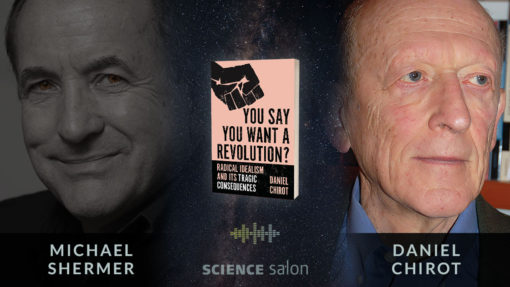Hitler

Shermer and the Posners discuss: the nature and banality of evil • Are we all potential Nazis? • Mengele, Eichmann, Himmler, Hitler • The Pharmacist of Auschwitz • the Holocaust • the Stanford Prison Experiment • Milgram’s shock experiments on obedience to authority • Abu Ghraib and other war crimes • restorative justice • the opioid crisis • the Vatican and the future of Catholicism.

Robert Zubrin takes a renewed look at his 2015 Skeptic article about the Mystical High Priest of Russian Fascism, Alexander Dugin, in light of Putin’s recent, full-scale invasion of Ukraine. It will strike readers as all too prescient.
Michael Shermer speaks with Professor of International Relations, Dr. Jacek Kugler, about his Power Transition Theory as it pertains to China, Russia, and Ukraine. PLUS: Robert Zubrin takes a renewed look at his 2015 Skeptic article about the Mystical High Priest of Russian Fascism, Alexander Dugin, in light of Putin’s recent, full-scale invasion of Ukraine.

In this lecture on Holocaust Denial, Dr. Shermer employs the methods of science to history, showing how we can determine truth about the past.
In this lecture on Holocaust Denial, Dr. Shermer employs the methods of science to history, showing how we can determine truth about the past.

In his Skepticism 101 lecture on Pathways to Evil (Part 1), Dr. Michael Shermer considers the nature of evil in his attempt to answer the question of how you can get normal civilized, educated, and intelligent people to commit murder and even genocide.
In his lecture on Pathways to Evil (Part 1), Dr. Michael Shermer considers the nature of evil in his attempt to answer the question of how you can get normal civilized, educated, and intelligent people to commit murder and even genocide. PLUS, this weekend only, Skeptic magazine back issues (in print or digital formats) are on sale for only 99 cents each!
In Science Salon # 106 Michael Shermer speaks with Daniel Chirot about his book You Say You Want a Revolution? Radical Idealism and its Tragic Consequences. PLUS: An excerpt from Is A Good God Logically Possible? by James P. Sterba.

Why have so many of the iconic revolutions of modern times ended in bloody tragedies? What lessons can be drawn from these failures today, in a world where political extremism is on the rise and rational reform based on moderation and compromise often seems impossible to achieve? Daniel Chirot examines a wide range of right- and left-wing revolutions around the world — from the late eighteenth century to today — to provide important new answers to these critical questions.

On the 75th anniversary of the liberation of the Auschwitz death camp, Michael Shermer and Alex Grobman present a brief history of how a concentration camp became an extermination center.
On the 75th anniversary of the liberation of the Auschwitz death camp, Michael Shermer and Alex Grobman present a brief history of how a concentration camp became an extermination center.
In the documentary film Expelled, Ben Stein attempted to link Darwin to Hitler and thereby condemn the scientific theory of evolution by association with the political theory of National Socialism. The film failed, but was there a historical connection between the social Darwinists of the 19th century with the National Socialists of the 20th century? Yes, through the personage of the German biologist Ernst Haeckel; but a new biography claims to rehabilitate Haeckel by disconnecting him from German social Darwinism.…
One of the most difficult problems in the social sciences is understanding why some people intentionally inflict emotional and physical pain on others. Such intentional pain occurs not only on a local level — within families, with “friends,” or in work situations, but also on a national and international scale — Hitler’s Holocaust, Stalin’s purges, and Chairman Mao’s slaughter of millions. Neuroscience is providing the potential for a revolution in our understanding of why “bad” people do what they do…
In this week’s eSkeptic, Michael Shermer examines the Faustian Bargain of David Irving.
In this week’s eSkeptic, Michael Shermer examines Holocaust denier tactics.














